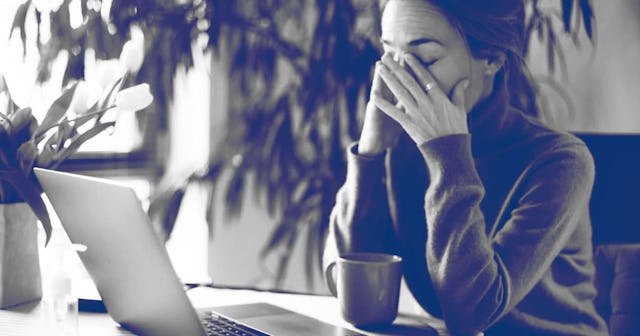Dealing With The Pandemic Has Become An Emotional Mindf*ck

Back in March, when the world shut down, the world was weird and scary and heavy. We were thrown into this new world where every decision was weighted and confusing. Should I go to the store, or have my groceries delivered? Can I take a walk around the block? Should I order carryout to support local businesses, or use up all those pantry staples that have been sitting on the shelves for months?
But a few things were crystal clear: Wear a mask. Don’t hang out with people who aren’t living in your household. And stay the fuck home.
Over the past few months, we’ve learned a lot about the virus. Going out in public with a mask has become routine. (Well, unless you live amongst anti-maskers.) We don’t need to wipe down those groceries. And we’re encouraged to get fresh air and spend as much time as possible outside. (The virus is less transmissible outdoors.)
But other risks are much less discernible. In fact, many things feel more confusing than ever.
Since the very beginning, it was all about risk assessment. What is the price we pay for not shutting down compared to the price we pay for closing businesses, moving to a remote workforce, and shutting ourselves off from our family and friends?
To make the decision-making process a little clearer, Scary Mommy shared a risk assessment system created by Emily Oster, a professor of economics at Brown University and parent, that looked like this: (1) frame the question, (2) mitigate risk, (3) evaluate risk, (4) evaluate benefits, and finally, (5) decide.
When I first read this risk assessment tool, it made perfect sense. But now, I find it breaking down for me, and here’s why.
First, I don’t even know how to frame the question. We can’t ask ourselves, should I take a vacation this summer or next summer, because we don’t know if it will be any safer next summer than this year. We can’t ask ourselves, should my kids play with their friends this weekend or in a couple months, because we don’t know if it’ll be any safer in a couple months. We can’t ask, should my kids go back to school in-person, or wait until it’s safer, because – you guessed it – we DON’T KNOW WHEN IT WILL BE SAFER.
We have no idea when the pandemic will end, or even when things will be a little any better, so we can’t make an adequate risk assessment. And this never-ending feeling – and very long-term reality – has its own very serious risks. Especially when it comes to the very people we are trying to protect.
Andrew Merry/Getty
My dad is 76 years old. He has Alzheimer’s disease, and other medical conditions that would put him in the high risk group. I want to protect him. I also want to protect my mom, who’s his primary care provider, from even getting a slight case of the sniffles. So I try to be very careful. I’ve only seen my parents twice since early March. Each time was with masks, mostly outside, and no physical touching.
But at this stage, these safety precautions also carry a steep price. The risks of COVID are very real, but so are the risks that my dad won’t remember my name in a year.
The further we get into the pandemic, the less clear it becomes to do what is “right.”
Of course, there are still very clear lines. That 40th birthday party with a booze cruise could be postponed to your 41st. A graduation party could be over Zoom or with a socially distanced backyard gathering with only close family. Vacations can be postponed, and for fuck’s sake, all those college frat parties and weekends at the bars can be skipped all together. The price to be paid for doing these things far outweighs the price of skipping them.
Life is indeed short and precious. So very precious. Which is why so many of us are willing to do things like wear masks and avoid restaurants and postpone activities we love so much.
But what about when it comes to people for whom time is even more limited? How does the risk assessment change when it comes to these relationships? Are we protecting them by keeping our distance, or are we hurting them?
I don’t know.
I have absolutely no idea, and it is a complete mindfuck. I have no idea what the right answer is, and it’s driving me bonkers. I wish I could have Dr. Fauci on speed dial so he could help me understand. But I don’t.
I’m confused. And scared. And angry. So fucking angry.
I’m angry at all those people who can’t even pay the very modest price of skipping that pool party or wearing a damn mask at the grocery store, which means the rest of us keep paying the price. I’m downright livid at the complete lack of leadership at the national level, and disheartened that, as the rest of the world is getting the virus under control, we can’t seem to get our act together.
It didn’t have to be this way.
It shouldn’t have to be this way.
This article was originally published on